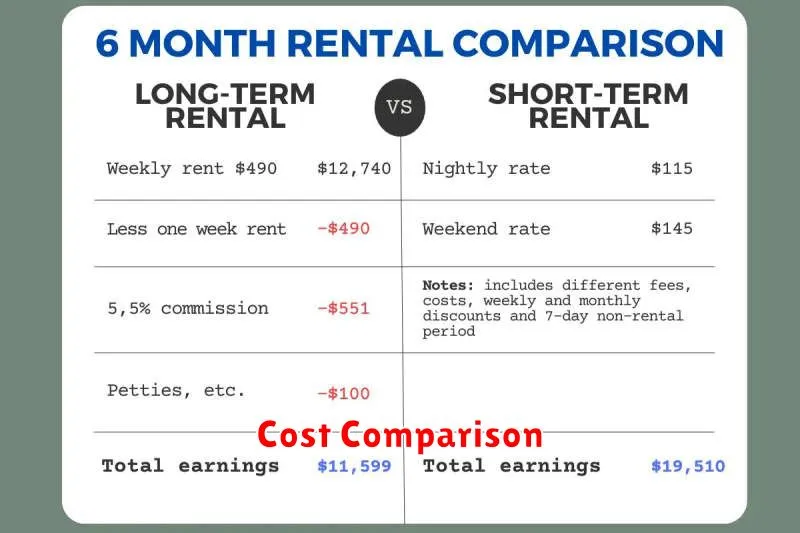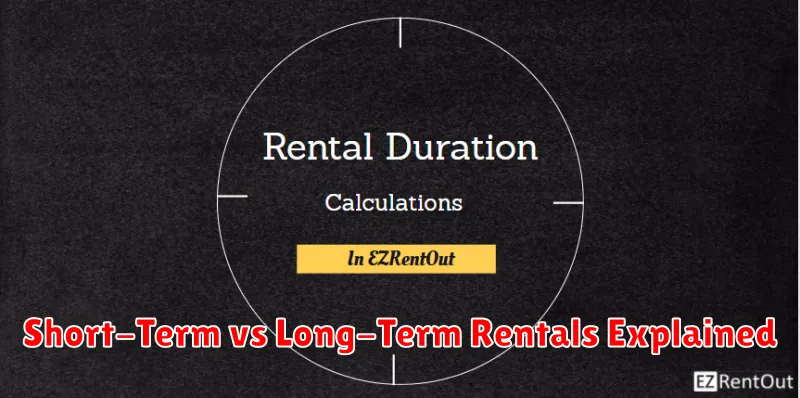Are you considering investing in real estate or simply looking for a new place to live? Understanding the difference between short-term rentals and long-term rentals is crucial for making informed decisions. This article will explore the nuances of each, outlining the advantages and disadvantages of both short-term rental and long-term rental strategies. Whether you’re seeking higher potential income with short-term rentals or the stability of long-term rentals, this guide will provide valuable insights to help you navigate the complexities of the rental market.
From lease agreements and tenant management to property maintenance and legal considerations, we’ll delve into the key factors that distinguish short-term rentals from long-term rentals. This comprehensive comparison will equip you with the knowledge necessary to determine which rental strategy aligns best with your financial goals and lifestyle preferences. Explore the world of short-term rentals and long-term rentals with us and discover the optimal path towards maximizing your investment or finding your perfect home.
Key Differences
Several key factors differentiate short-term and long-term rentals. Understanding these distinctions is crucial for making informed decisions as both a landlord and a tenant.
Lease Duration
The most obvious difference lies in the lease duration. Short-term rentals typically involve leases lasting from a few days to a few months, often less than six months. Long-term rentals, conversely, involve leases of a year or more.
Furnishing
Short-term rentals are commonly fully furnished, providing tenants with everything they need for a comfortable stay. Long-term rentals can be furnished or unfurnished, providing more flexibility for tenants to personalize their living space.
Cost & Payment
Short-term rentals generally have a higher nightly or weekly rate but often include utilities and other amenities in the overall price. Long-term rentals have a lower monthly rent but typically require tenants to pay for utilities and other services separately.
Cost Comparison

When comparing short-term and long-term rentals, cost is a critical factor. Short-term rentals, such as vacation homes or Airbnb stays, often have a higher nightly or weekly rate. However, the overall cost depends on the length of stay.
For short stays (a few days to a couple of weeks), short-term rentals can be more economical than hotels. For longer stays (several weeks to months), long-term rentals, like apartments or leased houses, typically become more cost-effective due to lower monthly rates and the absence of additional fees like cleaning charges or service fees.
Additional expenses to consider include utilities, which are often included in long-term rentals but can be extra for short-term stays. Furnishings and amenities also play a role. Short-term rentals are usually fully furnished, while long-term rentals may require furniture purchases.
Flexibility vs Stability
A core difference between short-term and long-term rentals lies in the flexibility and stability they offer. Short-term rentals provide greater flexibility for both tenants and landlords.
Tenants benefit from the ability to easily relocate or adjust their living arrangements without being tied down to a long-term lease. Landlords have the flexibility to adjust rental rates more frequently, potentially capitalizing on seasonal demand fluctuations.
Conversely, long-term rentals prioritize stability. Tenants secure a consistent living situation for an extended period, providing a sense of permanence. Landlords benefit from a stable income stream and reduced tenant turnover costs.
This trade-off between flexibility and stability is a key factor to consider when deciding between short-term and long-term rental options.
Furnishing and Services
A key difference between short-term and long-term rentals lies in furnishing and included services. Short-term rentals are typically fully furnished, providing everything from furniture and linens to kitchenware and appliances. They often include additional services like regular cleaning, Wi-Fi, and utilities bundled into the rental price.
Long-term rentals, on the other hand, can vary significantly. While some may come furnished, the majority are unfurnished, requiring tenants to provide their own furniture and set up utilities. Services like cleaning are usually the tenant’s responsibility.
This table summarizes the typical differences:
| Feature | Short-Term Rental | Long-Term Rental |
|---|---|---|
| Furnishing | Fully furnished | Typically unfurnished |
| Services | Often includes utilities, cleaning, Wi-Fi | Utilities and services typically separate |
Who Each Option Fits Best
Choosing between a short-term and long-term rental depends heavily on individual circumstances and priorities. Flexibility is key when considering short-term rentals. These options are best suited for individuals or groups with short-term housing needs, such as:
- Vacationers
- Business travelers on short assignments
- Individuals relocating and seeking temporary housing while searching for permanent residence
Conversely, long-term rentals offer stability and are generally more cost-effective over time. They best suit those seeking a more permanent living arrangement, including:
- Individuals or families relocating permanently
- Students attending school for an extended period
- Anyone desiring a stable and predictable housing situation
Ultimately, the best option hinges on the duration of stay, budget, and desired level of commitment.
Final Considerations
Choosing between short-term and long-term rentals requires careful consideration of your individual circumstances and financial goals. There is no universally “better” option, as the ideal choice depends on your risk tolerance, financial capacity, and desired level of involvement.
Tax implications vary significantly between the two strategies. Short-term rentals often offer more deductions but also require meticulous record-keeping. Long-term rentals typically involve simpler tax reporting.
Local regulations play a crucial role. Some areas heavily restrict short-term rentals, while others are more permissive. Research your local laws thoroughly before making a decision.

